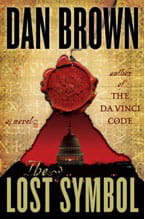By Beth Davies-Stofka  Are you fretting that the version of American history in Dan Brown's The Lost Symbol is the true one? That it is hidden from the American masses by some shadowy, self-appointed elite?
Are you fretting that the version of American history in Dan Brown's The Lost Symbol is the true one? That it is hidden from the American masses by some shadowy, self-appointed elite?
Don't worry! Brown plunks down a giant clue from the get-go that The Lost Symbol is a work of fiction. Most of the working-class supporting cast is glued to a football game, a playoff featuring the Washington Redskins. If you know your NFL, you'll know that the Redskins have been mired in futility since their last playoff appearance in 1999 (although they were eliminated from a wild-card bid by the Seattle Seahawks in 2007).
The Redskins playoff game is a joke, and a reminder from the start that Brown's tongue is firmly in cheek. He's having a good time, and he wants you to have one too. The Lost Symbol has all the accoutrements the "It Thriller" is wearing this season. There is the super-villain who has taken the cult of self-improvement to its ultimate conclusion, the sinister government official with all the tools necessary to take over the world, (and none of the oversight that might hold such plans in check), the benevolent patrician who has suffered a terrible tragedy, the sexy scientist with a mind of her own, and finally, of course, there is Robert Langdon, our hapless-yet-brave hero who doesn't know what he's involved in, yet finds it incredibly interesting, although a bit troubling.
They're all racing to obtain or protect a fabulous treasure that promises untold wealth and power. This treasure is nothing less than the Ancient Mysteries (cue ominous brass section), the unfathomable wisdom of ancient Egypt preserved through the millennia by a succession of secret societies -- most recently the Freemasons -- and hidden by the founding fathers in Washington, D.C. Those who possess this wisdom are said to experience apotheosis. They are transformed from humans into Gods.
A delicious whiff of paranoia permeates the entire concept. Secret societies -- basically networks of old boys' clubs who thrive on wealth, bloodlines, and power -- are conspiring to manipulate the American public while insisting that it's "for our own good." Secret government organizations are basically doing the same thing, although without the same claim to nobility or noble intent. At the very core of Washington, D.C., entirely hidden from our view, are powerful groups who keep secrets-within-secrets, who paternally or cruelly decide the destiny of the governed entirely without their consent.
We readers already suspect that democracy has slipped away somehow, and that political realities are cleverly hidden in games, codes, ciphers, and secret passageways. Brown taps into our suspicions in a terrific metaphor for just how exclusive and anti-democratic Washington has threatened to become.
Consider what happens to that working-class supporting cast. Surrounded by people of immense wealth, power, and privilege, the regular Joes of Washington are reduced to providing their security in exchange for a paycheck. Brown's security guards are all just trying to root for the Redskins. But they are routinely under surveillance (the wealthy are not), videotaped, recorded, manipulated by their employers, threatened, fired, and killed. The very wealthy take advantage of them, timing criminal acts to occur during the game.
Seen from the point of view of these extremely minor characters, Brown could be said to have written a dystopian account of the plight of workers everywhere. Perhaps The Lost Symbol should be read as a working-class manifesto, a call to get our heads out of the football game, and start paying attention to how viciously Washington is exploiting us.
As dystopias go, this one is a blast. It takes a little while to pick up steam, but once it does, it's a true page-turner. The chapters are short, the points of view limitless, the pacing rapid, and of course you root for Langdon, even though neither you nor he know what a victory will look like, beyond surviving to sleuth another day.
The DaVinci Code aroused passion and curiosity, and launched countless church study groups in which congregations heard, for perhaps the first time, about how the New Testament was written and canonized. The hypothetical Q document (from the German Quelle, or source) finally had its 15 minutes of fame.
The Lost Symbol might accomplish the same for American history. I envision study groups springing up all over the country, digging anew into the origins of Washington, D.C. and the beliefs, practices, and fondest hopes of this country's founders. Perhaps we'll enjoy renewed demands for a fair distribution of access to the nation's power.




